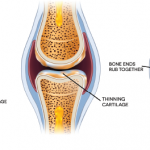It has long been known that hyperlipidemia adversely affects bone, but the exact pathologic mechanism(s) underlying hyperlipidemia-induced bone loss has not been fully understood. Until now. Pathogenesis of Osteoporosis New research by Ambrogini and colleagues shows that oxidation-specific epitopes derived from lipid peroxidation contribute to the pathogenesis of osteoporosis.1 Importantly, the research shows that innate…








